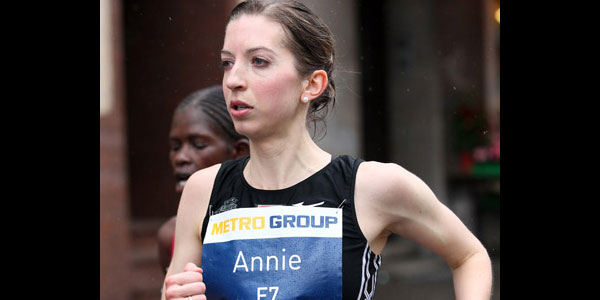
Six days after Boston there was another surprising American marathon victory: In rainy conditions Annie Bersagel won the Metro Group Marathon Duesseldorf with a personal best of 2:28:59. She overtook Selomie Getnet with only three kilometres to go.
Annie Bersagel takes Duesseldorf, Gilbert Yegon wins men’s race
The Ethiopian, who had a big lead in the middle of the race, was second with 2:30:29. Kenya’s Emily Ngetich ran 2:30:50 for third place. Gilbert Yegon won the men’s race with 2:08:07. On slippery roads the Kenyan missed the course record by 19 seconds. Endeshaw Negesse was second with 2:08:32 while his fellow Ethiopian Fikadu Teferi ran 2:09:34 in his debut for third place. Adding other running events staged parallel to the marathon a total of 16,000 runners competed in the Metro Group Marathon Duesseldorf.
The men’s race started fast with split times of 29:54 at 10 k and 44:56 at 15. When a group of 16 runners passed the half way mark in 63:31 they were still well on course for the course record of 2:07:48 run by Dereje Debele. The defending champion from Ethiopia was among the leaders at this stage. However in very wet and cool conditions with temperatures little above 10 Celsius Debele was among those who suffered badly during the second half. But the first of the favourites who lost contact to the group was fellow Ethiopian Shami Abdulhadi Dawud. The second fastest on the start list with a PB of 2:05:42 started to loose ground around the 25 k mark (1:15:36) and later dropped out at 31 k.
While Kenyan pacemaker Ronald Korir bravely held on to the 35 k mark, which he reached in 1:46:04, Debele had lost contact three kilometres earlier. Suffering of cramps the Ethiopian dropped out at 38 k. Five runners were still in contention after Korir dropped out and the course record was still a possibility for Yegon, Negesse, Teferi, Shengo Kebede (Ethiopia) and Moses Masai (Kenya). However with the pacemaker gone it was only Yegon who was able to push the pace. For a short period it looked as if Negesse would be able to hold on, but the fastest runner on the start list with a PB of 2:04:52 was also suffering in the cold and wet conditions. “I had a look at him before I drew away and he did not look that strong any more,” said Gilbert Yegon, who celebrated his second marathon victory during his career. Back in 2009 he had won in Amsterdam with a time of 2:06:18 which still stands as his personal best. Since then the 25 year-old struggled when trying to take another race or improve his PB.
“I am very happy to have won my second marathon now. It was my aim to win the race and my goal was to run 2:06 – but this was not possible in these conditions,” said Yegon, who was followed by Negesse (2:08:32), Teferi (2:09:34), Kebede (2:10:14) and Masai (2:10:36) after finishing on the promenade next to the river Rhine.
Pre-race favourite Getnet, who entered the race with a PB of 2:25:15, took the lead immediately in the women’s race. Passing the half way mark in 1:13:25 she was well clear of second placed Winfrida Kwamboka (Kenya) but the course record of 2:25:49 proved to be out of reach. Running together with Ngetich America’s Bersagel passed the half way point 1:37 minutes behind Getnet.
But Kwamboka and Getnet could not keep their pace. Normally the second half of the race in Duesseldorf is considered to be faster than the first half, but not so today. It was before the 30 k mark, when Bersagel overtook Kwamboka. But 31 year-old, who had entered the race with a PB of 2:30:53 from last autumn and more recently showed a fine performance in the World Half Marathon Championships where she finished 13th, did not think about victory at this stage of the race. That changed around 38 k. “It was then, when I suddenly saw the leading car and I realised that I made up ground quickly,” recalled Bersagel. She passed Getnet with around three kilometres to go and became the first US champion in the history of the Metro Group Marathon Duesseldorf.
image credit: Victah Sailer / photorun.net








